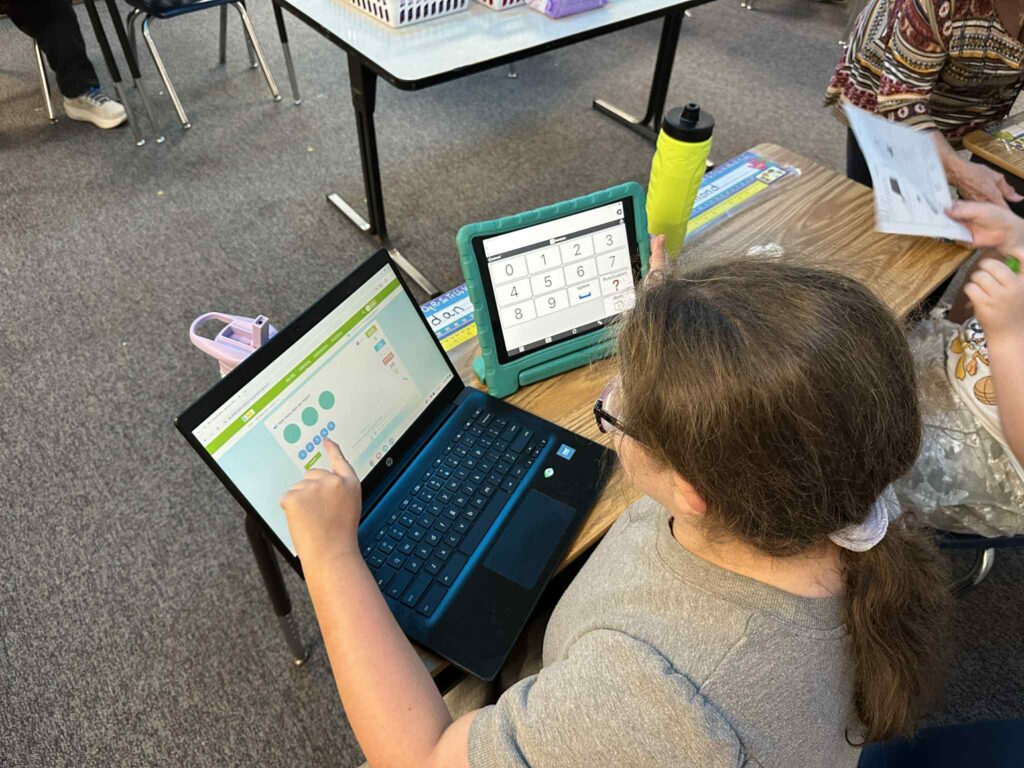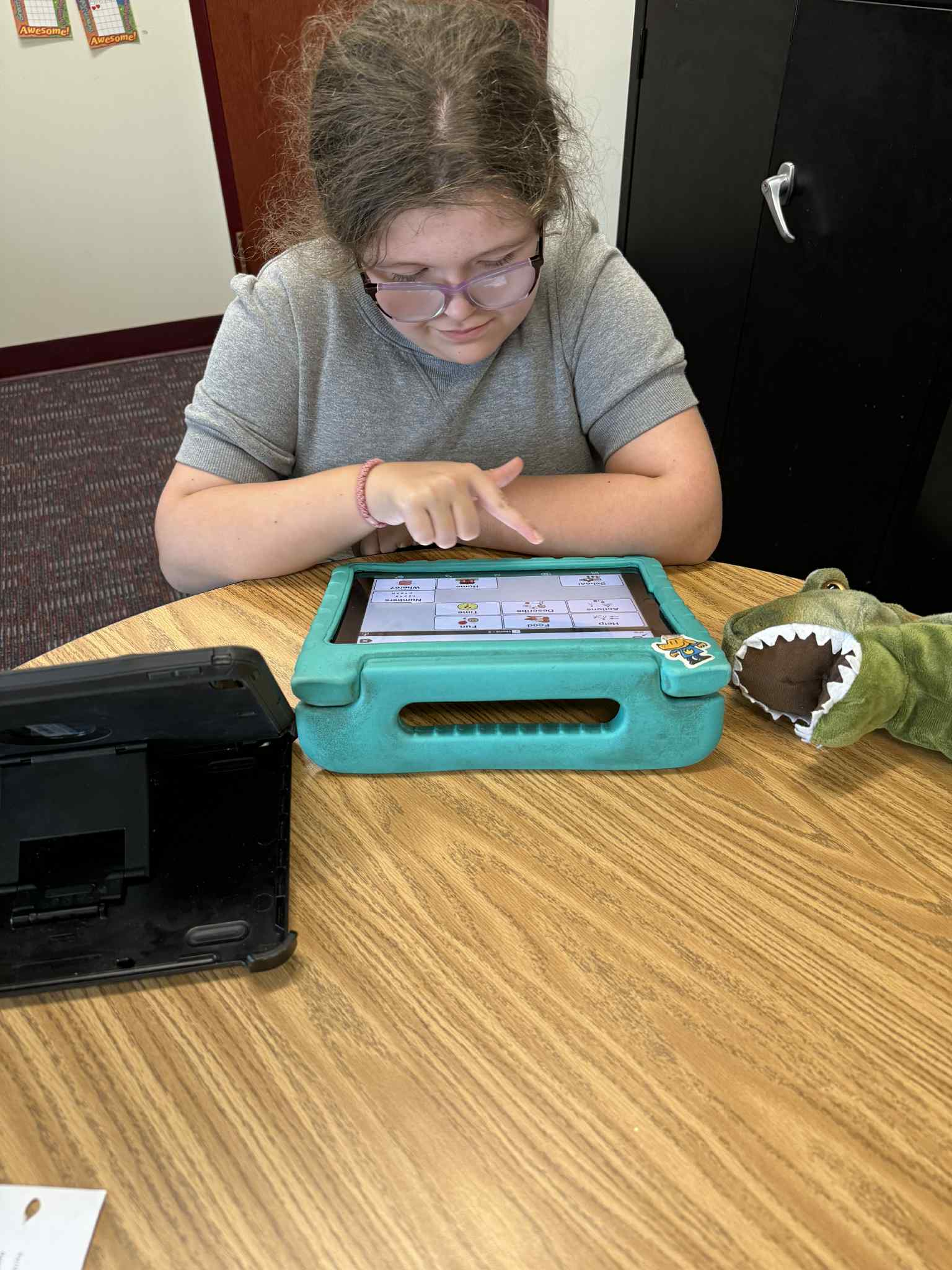At 13 years old, Kenley Jordan is living a vibrant life surrounded by friends, family, and her favorite hobbies. She looks forward to riding the school bus each day and enjoys swimming, cooking, horseback riding, taking pictures, and spending time with her close-knit group of friends. Through Self Direction and with the support of her Care Manager, Amanda, Kenley has access to programs and services that match her interests and needs. Kenley uses an iPad to help her participate in the activities she chooses and communicate with the people in her life. Her communication journey hasn’t been without challenges, but thanks to the dedication of her family, education team, and Care Manager, Kenley continues to grow, express herself, and live life on her own terms.
Kenley’s mom, Jamie, shares that Kenley initially began speaking a few words, however, she stopped speaking around 18 months old. At this time, Kenley’s parents also noticed a decline in her motor skills. They began early intervention services, and once Kenley reached school age, they began the process of getting services. Kenley’s parents joined LIFEPlan to find someone to answer their questions and connect them with supports and programs that would help foster Kenley’s independence and involvement in her community. When they were connected with Amanda, she began facilitating the process of obtaining Self Direction services, which Kenley’s mom says was a huge relief.
“The waiting period from the unknown of not having services until we met Amanda, honestly, as a parent, I felt completely lost. I didn’t know how to help my child because there’s no guidebook or rule book saying this is the organizations you can go to. This is who you can ask for help.” – Jamie Jordan
Amanda has been instrumental in helping Kenley and her family access vital supports and services that, according to Jamie, have made a significant impact on Kenley’s life. Through these resources, Kenley received a treadmill, a Yogibo chair, and most notably, an iPad. Kenley’s iPad has transformed her ability to communicate and has become a powerful tool for independence, self-expression, and connection.
Kenley began using an iPad in preschool, following a recommendation from her speech pathologist to help her form words and express her needs. Since then, the device has been an essential part of her daily life, supporting communication at home, in school, and in social settings. With a health app, Kenley can explain when she’s feeling sick or in pain. She also uses her iPad to make choices about what she wants to wear, what she wants to eat, and more. And through working with her current speech pathology therapist, Kenley is now using the iPad to type out full sentences. Kenley’s mom jokes that she sometimes uses it to let her know that she is unhappy with her.
“It’s a typical teenager that I’m getting responses from now. [] It gives her a voice to speak up for herself, even if it’s as a sassy teen.” – Jamie Jordan
 Kenley uses her iPad throughout the school day to support her communication and learning. At the start of each school day, she uses her iPad to get organized and participate in the daily catch up and planning time with her teacher and her classmates. She also uses her iPad at lunchtime to pick what she wants to eat. While some of her classmates use Chromebooks for certain curriculum, Kenley uses her iPad, since she has found that the keyboard on it is more accessible for her. She also uses her text-to-speech program to answer questions during group discussions. Her iPad empowers her to actively participate in class, engage in conversations, and build meaningful connections with peers and teachers.
Kenley uses her iPad throughout the school day to support her communication and learning. At the start of each school day, she uses her iPad to get organized and participate in the daily catch up and planning time with her teacher and her classmates. She also uses her iPad at lunchtime to pick what she wants to eat. While some of her classmates use Chromebooks for certain curriculum, Kenley uses her iPad, since she has found that the keyboard on it is more accessible for her. She also uses her text-to-speech program to answer questions during group discussions. Her iPad empowers her to actively participate in class, engage in conversations, and build meaningful connections with peers and teachers.
For Kenley, her iPad is a necessary piece of assistive technology. It helps her communicate her feelings, her needs, and her choices. Without it, it is difficult for her to express what is on her mind and can lead to frustration. That is why it was so important to replace her iPad when it broke. Initially, coverage for a new iPad was denied twice. Kenley’s Care Manager, Amanda, gathered letters from the people in Kenley’s life and made sure that the iPad was included in her Life Plan. With the help of Kenley’s speech pathologist, her doctor, and her family, Amanda was able to successfully advocate for a replacement. Amanda said her driving goal was supporting Kenley’s independence.
“All I want for her is to be as independent as she can be. To speak up for herself and know she can be happy and healthy.” – Amanda Arnt
Kenley’s story is a powerful example of how persistence and thoughtful care management can lead to meaningful outcomes. With the right supports, advocacy, and assistive technology, she’s able to communicate, connect, and thrive.

